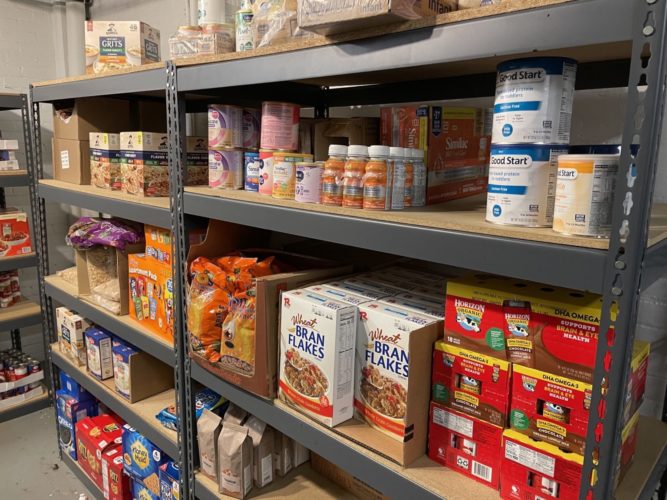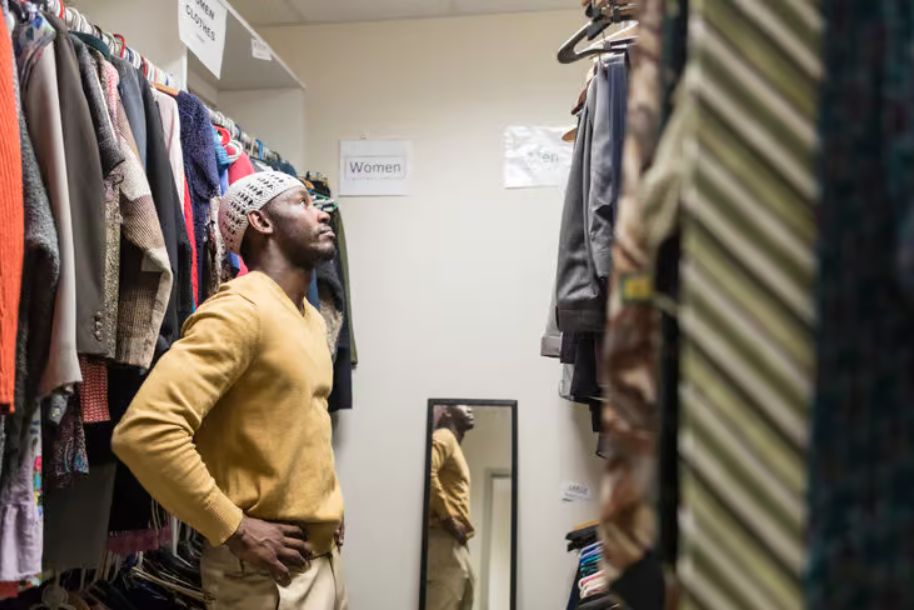Cleveland workforce programs offer wraparound supports, address barriers to employment

As part of its WorkAdvance model, Towards Employment offers wraparound supports, or services that benefit the “whole person” outside of clocking in and out of work. (Courtesy of Towards Employment– photo by Amber Ford)
With many employers facing worker shortages, many have asked the question, “Where are the workers?”
“A lot of people are really worrying about why there are so many for-hire signs, why are people having such a hard time finding employees, why are people in Cleveland having such a hard time finding jobs,” said Renée Timberlake, director of economic mobility at United Way of Greater Cleveland.
Barriers to work, including lack of access to transportation, child care, and basic needs, hinder people from landing jobs and sticking with them. But employers do not always understand or acknowledge these barriers, said Tanya Budler, founder of consulting firm Rise Together.
Workforce and social services organizations like Towards Employment and The Centers are stepping in to provide wraparound supports to reduce barriers to work while also calling for collaboration to find longer-term, systemic solutions. While both organizations have been doing this work since the 1970s, they hope that current labor shortages will bring more attention to the need for such services and solutions.
The factors that affect workers’ well-being and ability to succeed in their jobs, such as access to child care, transportation, broadband connection, and healthcare, are also known as the “social determinants of work.” They’re the focus of an initiative led by United Way of Greater Cleveland and Towards Employment to bring together nonprofits, businesses, and local governments to address barriers to work.
“The whole idea of social determinants of work, it’s not just the individuals who are seeking jobs and those who support them. It’s not just their problem, right?” said Jill Rizika, president and CEO of Towards Employment. “It’s, ‘Where can employers help? Where can policies be changed? There’s a long and a short answer to many of these things, but many of these are really based on the impact of structural racism that has existed and generated these disparities over a long period of time.”
Workforce programs provide wraparound supports
For organizations like Towards Employment, the “short answer” looks like wraparound support, or meeting the immediate needs of job-seekers and workers by providing help with transportation, basic needs, and child care.
Wraparound supports are services that benefit the “whole person” outside of clocking in and out of work, said LaShon Sawyer, director of policy and advocacy at Towards Employment. The services include access to mental health care, sobriety groups, daycare, and transportation. If Towards Employment doesn’t offer a particular service itself, it refers clients to other organizations and resources that do.
Research by Towards Employment shows that these types of support do make a difference — a report about the organization’s WorkAdvance model found that job-seekers who received wraparound supports and career coaching as part of WorkAdvance were four times more likely to complete technical training than those who didn’t receive this support.


The Basic Needs Resource Center at The Centers offers essentials such as food, hygiene products, and household supplies at no cost to clients, including participants in the El Barrio workforce program. (Courtesy of The Centers)
The Basic Needs Resource Center at The Centers, another Cleveland nonprofit, also provides essentials such as food, hygiene products, and household supplies at no cost to clients. The resource center has been a huge help for meeting the immediate needs of participants in The Centers’ El Barrio workforce program, said Melissa Russoniello, director of El Barrio and workforce at The Centers. Through the resource center, clients have easy access to items like shampoo and hygiene products, whose costs can add up and can be difficult to fit into a limited budget while balancing other, larger expenses.
“For us to be able to supply those to somebody so that they can be prepared for an interview, prepared to come to class, prepared to go to a counseling appointment and feel comfortable and confident, I think that that is just an enormous thing that we can do,” Russoniello said.
The Centers is also home to two behavioral health urgent care centers for mental health needs, Russoniello added.
Sara Black, an El Barrio participant, signed up for the workforce program when she was preparing to return to the workforce after being a stay-at-home mom. She started the program in the late spring and is currently interning at The Centers’ peer recovery support program, a position that aligns with her long-term goal of working in the mental health field.
El Barrio helped Black mitigate some of the barriers that come with being a parent and working. The team provided her with diapers and wipes and helped her buy books, get a coat for her child, and find child care.
In addition to helping with resources to meet her child’s needs, El Barrio was also accommodating to the challenges Black faced as a single mom, such as providing flexibility with her schedule and allowing her to have her child with her during virtual sessions.
“Parenting is wonderful, but it’s hard to try to do everything that you want to do while also having to take care of another human,” Black said. “No matter how dedicated you are – and I was very, very dedicated – there are times, being a single mom, that I couldn’t come or I couldn’t make my online class. And they were really accommodating.”
Black is finishing the process of receiving her certification to work with children, teens, and young adults with mental health and substance use disorders, which she said will open doors for her, including allowing her to apply for the position she wants at The Centers. “I really wanted to be who I felt like I needed when I was younger,” she said, and The Centers is helping her achieve a goal that previously seemed out of reach.
“I never thought I’d be able to be in the position to help people that were like me, and they really give you the confidence to do that and the tools to do that,” she said.

To address barriers to work, Towards Employment provides job-seekers and workers with wraparound supports, including clothes for work or interviews and help with transportation and child care. (Courtesy of Towards Employment– photo by Amber Ford)
Support that doesn’t stop with landing a job
Individualized career coaching and support that continues even after a person has gotten a job is also key to addressing barriers to work, said Towards Employment’s Rizika.
“Just because you get that first job doesn’t mean that all those issues disappear suddenly,” she said.
Towards Employment serves about 2,000 people a year. When someone walks in its doors, the organization works with them to develop a “career map” identifying their long-term goals and the ways Towards Employment can help them achieve them. The organization connects clients with a career coach, who continues to support them and connect them to resources after they’ve completed a workforce program or obtained employment.
Last month, Kierston Gouldlock started a full-time position managing the front end of the building at PCs for People, a nonprofit that provides refurbished computers at a low cost to people who need them.
Towards Employment helped her find a daycare provider, and the nonprofit’s two-week career readiness program helped her identify transferable skills from her previous work experience and update her resume.
But the support didn’t stop when she got a job. She still keeps in touch with her Towards Employment career coach, who she said she can reach out to at any time to send updates or ask for additional support.
“It’s just all-around support, continuous support, and that is what I really love most about Towards Employment,” Gouldlock said.
The Centers’ El Barrio workforce development program also pairs its clients with career coaches who connect them with resources addressing barriers to work. Day to day, the career coaches “work hand in hand” with clients to eliminate or reduce barriers, said career coach manager Orlando Grant.
“We really help to not only reduce those barriers and be the connector or the liaison to transportation or child care, but then we also provide case management and resources to help them get the job and not only get the job, but stay at the job once they are in it,” Grant said.

Towards Employment pairs clients with career coaches who help them map their career goals and the steps to achieving them. The coaches continue to provide support and connections to resources after a client completes a program or lands a job. (Courtesy of Towards Employment– photo by Amber Ford)
Some employers step in, plans for the future
Outside of workforce development programs, some employers have taken steps to address the barriers that their employees are facing. YWCA Greater Cleveland offers what it calls “equitable paid time off,” meaning it doesn’t track the number of days or hours employees take off. It’s part of an effort to become a “trauma-informed workplace” that recognizes the impact that the employees’ work can have on their well-being, said Deborah Matese, executive president of administration.
“People needed to be able to take off for their sick children and not be afraid that they were gonna lose their job if they also took a vacation,” Matese said.
The Early Learning Center, a child care facility, is also located on site, and employees receive a discount, she said.
United Way and Towards Employment’s social determinants of work initiative wants to bring more employers on board. So far, it’s held four employer engagement sessions and eight community action planning sessions to hear from residents and community organizations. The initiative is holding an event with Dr. Angela Jackson, who coined the term “social determinants of work,” as the keynote speaker on March 28. Timberlake is working on a report, which will be published before the event.
In partnership with Rise Together, Towards Employment and United Way will also start building a coalition of partners across sectors, and Timberlake hopes the group will hold its first meeting by the second quarter of this year. The effort will be a failure if it results in just talk with no real change, both Timberlake and Budler said.
“I have looked at all of these individuals straight in the eyes who’ve shared their life stories and their challenges,” Budler said of the community engagement sessions. “And we feel very motivated personally and professionally to do as we told them we would, to make it even just one notch better for them to have a job that they want.”
Underwriting support for this article was provided by HFLA of Northeast Ohio, which provides interest-free loans to promote the economic self-sufficiency and growth of Northeast Ohioans who are unable to access safe and fair lending resources.
